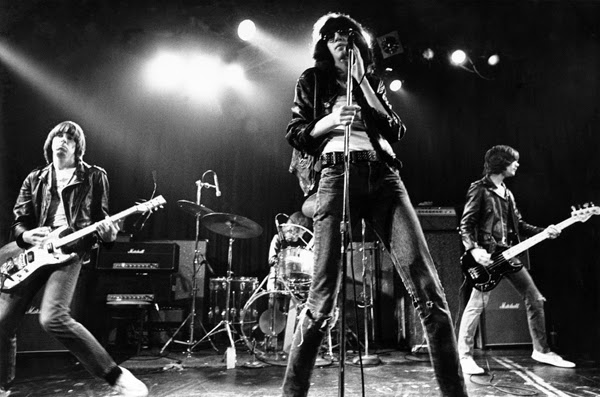What's new?
How is the world treating you?
You haven't changed a bit
I met legendary music journalist Lisa Robinson in May 2014 when she came to a Washington bookstore to speak about her new book, There Goes Gravity: A Life in Rock and Roll.
 |
Lisa, who is currently a contributing editor for Vanity Fair, has been going to concerts and writing about rock music for over 40 years.
She got to know everyone who was anyone in the music world during that time – including the Rolling Stones, Led Zeppelin, David Bowie, Lou Reed, John Lennon, the Ramones, Iggy Pop, the New York Dolls, the Clash, Bruce Springsteen, U2, Eminem, and Lady GagaOn Bob Dylan: (to name just a few).
 |
| Lisa Robinson with David Bowie |
I dove into There Goes Gravity on the way home from hearing Lisa speak at the bookstore. But for some reason, I never read the book’s last chapter until this week.
That chapter is of a miscellany of anecdotes and observations from the entirety of Lisa’s career. Here are a few excerpts:
On Bob Dylan:
He was, and still is, one of the few of his generation who had grown old but had not grown old and irrelevant.
On drummers:
[Record] producers often hate drummers. Funnily enough, they prefer a drummer who can keep time, as opposed to someone who has the right “feel,” or had been in the band since the band was formed in college.
On the process of “mixing” musical tracks recorded in a recording studio:
I’ve been in studios when bands have stormed out, had fistfights, or broken up over mixes. . . . I’ve been there when some bands have listened to fifty or sixty mixes of the same song until you just want to scream that no one could possibly hear the difference.
On the late Ian Stewart, the pianist and road manager of the Rolling Stones (whose members insisted that he be inducted into the Rock and Roll Hall of Fame with them):
In 1981, when the Stones played with Muddy Waters at the Checkerboard Lounge in Chicago, Ian Stewart sat in on piano. I remember how Stu took a drink out of a bottle of whiskey, passed it around, then carefully put the top on the bottle so nothing would spill when he placed it back on the piano. Such was his respect for the piano.
On Mick Jagger:
[A]fter having spent hours and hours interviewing Mick, when people ask me what he’s really like, it’s still hard to explain. . . . Mick can be wildly entertaining and funny and smart. He can still light up a room. But he’s insecure. Wary. He can’t ever really get away from being MICK JAGGER.
On Led Zeppelin:
And no matter what the idiots thought about Led Zeppelin being a cheesy heavy metal band, their music was also about banjos, fiddles, blues, boogie-woogie, and the shuffle. Music from the Smoky Mountains. Howling’ Wolf and Muddy Waters and Chicago. The Mississippi Delta. Highway 61 revisited.
On modern-day concert tours:
By the time the Stones did their “Bridges to Babylon” tour in 1998, I had seen them in concert for 29 years. . . . I saw some great shows at Madison Square Garden. But the one on January 14, 1998, was different. . . . For $500 a ticket, people could have a beer, some potato chips, and a fast meet-and-greet with Ronnie Wood. I thought about how, in 1975, years before corporate sponsorship . . . [promoter] Bill Graham had set up hot dog carts . . . backstage at the [Stones’] New York shows. By 1998, it was all about business. . . . The songs were great, the band still played great. But none of it seemed to matter anymore. With my memories, I left midway through the show.
On Frank Sinatra and what music means to her:
In February 2012, I saw [composer and record producer] Jon Brian at Capitol Records’ recording studios in Hollywood. He was restoring Frank Sinatra’s great 1950s Capitol recordings. . . . Jon was taking off all the “gunk” that had “polished,” “improved,” and digitized the original songs. When Jon played the vocal track for “What’s New,” fifty years after Sinatra had recorded the song, you could hear Sinatra breathe. He was literally in the room with you. It was thrilling. . . . [I]t reminded me why I got into all of this in the first place. Ghosts everywhere. Passing it on. Let the good times roll. One more for the road. Full circle. The music remains. Some things last forever.
* * * * *
“What’s New?” was originally an instrumental titled “I’m Free,” which was composed in 1938 by jazz bassist Bob Haggart. A year later, Johnny Burke was hired to write lyrics for the song.
Bing Crosby was the first singer to record the song. It was subsequently recorded by Billie Holiday, Ella Fitzgerald, Robert Goulet, Jack Jones, Linda Ronstadt, and many others.
 |
Frank Sinatra’s version of “What’s New?” was released on his 1958 album, Frank Sinatra Sings for Only the Lonely, which Sinatra later said was his favorite album.
Here’s “What’s New?”:
Click below to buy the song from Amazon:



























